英国历史英文版
英国伦敦的历史作文英文
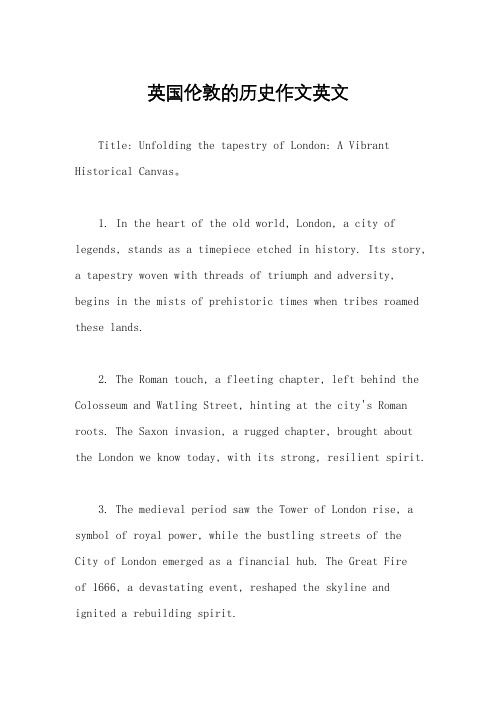
英国伦敦的历史作文英文Title: Unfolding the tapestry of London: A Vibrant Historical Canvas。
1. In the heart of the old world, London, a city of legends, stands as a timepiece etched in history. Its story, a tapestry woven with threads of triumph and adversity, begins in the mists of prehistoric times when tribes roamed these lands.2. The Roman touch, a fleeting chapter, left behind the Colosseum and Watling Street, hinting at the city's Roman roots. The Saxon invasion, a rugged chapter, brought about the London we know today, with its strong, resilient spirit.3. The medieval period saw the Tower of London rise, a symbol of royal power, while the bustling streets of theCity of London emerged as a financial hub. The Great Fireof 1666, a devastating event, reshaped the skyline and ignited a rebuilding spirit.4. The Industrial Revolution, a technological revolution, gave birth to the modern London, with itsiconic Tower Bridge and the Thames River, a lifeblood of trade and commerce. The 20th century saw the city transform into a cultural melting pot, with the West End's theaters echoing the laughter of the West.5. The present day, a city of contrasts, blends the old with the new. London Eye soars above the city, offering panoramic views, while the city's diverse population adds a vibrant layer to its cultural tapestry.6. London, a city that never sleeps, is a living testament to its enduring legacy. Its history, like aliving museum, is a testament to the resilience and adaptability of its people, forever evolving and preserving its past.7. In the end, London's history is not just a record of events, but a living, breathing narrative, a story that continues to unfold, waiting to be discovered by eachvisitor and resident who steps into its bustling streets.Remember, this is a snapshot, a snapshot of a city that timelessly weaves its tale, a city that is always, simply, ChatGPT.。
英国历史故事英文版
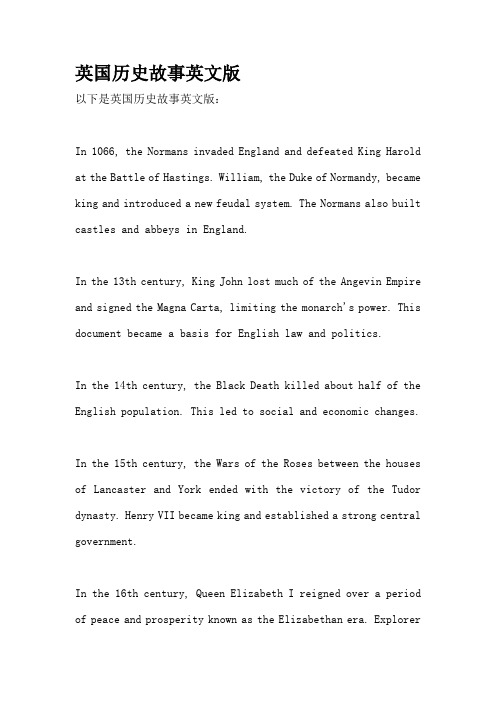
英国历史故事英文版以下是英国历史故事英文版:In 1066, the Normans invaded England and defeated King Harold at the Battle of Hastings. William, the Duke of Normandy, became king and introduced a new feudal system. The Normans also built castles and abbeys in England.In the 13th century, King John lost much of the Angevin Empire and signed the Magna Carta, limiting the monarch's power. This document became a basis for English law and politics.In the 14th century, the Black Death killed about half of the English population. This led to social and economic changes.In the 15th century, the Wars of the Roses between the houses of Lancaster and York ended with the victory of the Tudor dynasty. Henry VII became king and established a strong central government.In the 16th century, Queen Elizabeth I reigned over a period of peace and prosperity known as the Elizabethan era. ExplorerFrancis Drake circumnavigated the world in the Golden Hind.In the 17th century, King James I succeeded Elizabeth and established the Stuart dynasty. The English Civil War broke out in 1642 and ended with the execution of King Charles I in 1649. The monarchy was then abolished and replaced by a republican government known as the Commonwealth of England.希望这个故事能满足您的需求。
英语的发展史(中英文版)
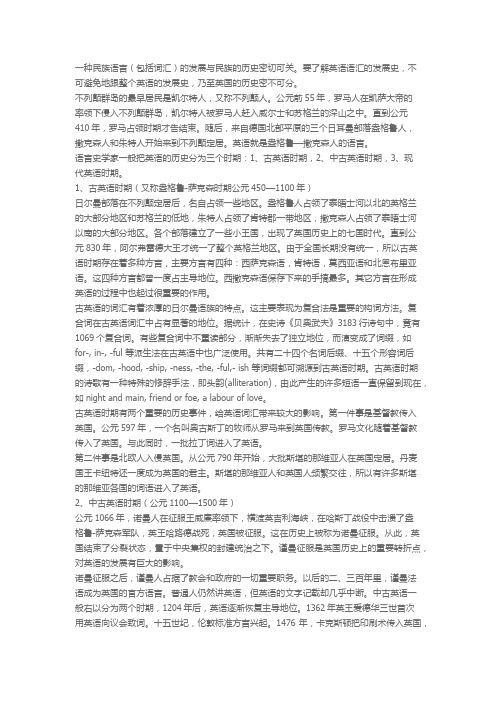
一种民族语言(包括词汇)的发展与民族的历史密切可关。
要了解英语语汇的发展史,不可避免地跟整个英语的发展史,乃至英国的历史密不可分。
不列颠群岛的最早居民是凯尔特人,又称不列颠人。
公元前55年,罗马人在凯萨大帝的率领下侵入不列颠群岛,凯尔特人被罗马人赶入威尔士和苏格兰的深山之中。
直到公元410年,罗马占领时期才告结束。
随后,来自德国北部平原的三个日耳曼部落盎格鲁人,撒克森人和朱特人开始来到不列颠定居。
英语就是盎格鲁—撒克森人的语言。
语言史学家一般把英语的历史分为三个时期:1、古英语时期,2、中古英语时期,3、现代英语时期。
1、古英语时期(又称盎格鲁-萨克森时期公元450—1100年)日尔曼部落在不列颠定居后,名自占领一些地区。
盎格鲁人占领了泰晤士河以北的英格兰的大部分地区和苏格兰的低地,朱特人占领了肯特郡一带地区,撒克森人占领了泰晤士河以南的大部分地区。
各个部落建立了一些小王国,出现了英国历史上的七国时代。
直到公元830年,阿尔弗雷德大王才统一了整个英格兰地区。
由于全国长期没有统一,所以古英语时期存在着多种方言,主要方言有四种:西萨克森语,肯特语,莫西亚语和北恩布里亚语。
这四种方言都曾一度占主导地位。
西撒克森语保存下来的手搞最多。
其它方言在形成英语的过程中也起过很重要的作用。
古英语的词汇有着浓厚的日尔曼语族的特点。
这主要表现为复合法是重要的构词方法。
复合词在古英语词汇中占有显著的地位。
据统计,在史诗《贝奥武夫》3183行诗句中,竟有1069个复合词。
有些复合词中不重读部分,渐渐失去了独立地位,而演变成了词缀,如for-, in-, -ful 等派生法在古英语中也广泛使用。
共有二十四个名词后缀、十五个形容词后缀,-dom, -hood, -ship, -ness, -the, -ful,- ish 等词缀都可溯源到古英语时期。
古英语时期的诗歌有一种特殊的修辞手法,即头韵(alliteration),由此产生的许多短语一直保留到现在,如night and main, friend or foe, a labour of love。
英国文化介绍(英文版ppt)
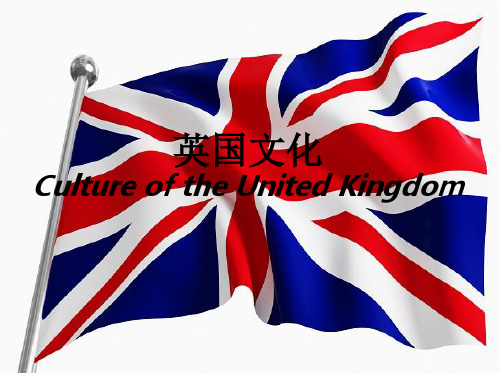
•
Milk Porridge
Red juice
• Many children at school and adults at work will have a 'packed lunch'. This typically consists of a sandwich, a packet of chips, a piece of fruit and a drink. The 'packed lunch' is kept in a plastic container.
这所房子最初建于1815年。在1860-1934年间, 曾用来出租。小说中的福尔摩斯正是于1881- 1902年 间居住于此。后来,有人买下了这所房子,直 到1990年,才正式建立了这个在世界上也许是独 一无二的博物馆。博物馆的结构与小说中完全相 同,加上精心的布置,使来此参观的人如同置身 于小说的场景之中 。口叼烟斗,总是带着一顶猎 帽的福尔摩斯,在阿瑟·柯南·道尔(Sir Arthur Conan Doyle)笔下成为闻名全球的名侦探,小 说中福尔摩斯和华生住在贝克街221B的二楼,前 方是他们共用的书房,后端则是福尔摩斯的卧室, 书房中陈列许多 福尔摩斯的道具,如猎鹿帽、放 大镜、烟斗、煤气灯等。博物馆三楼则呈现不同 小说中的知名场景,等福尔摩斯迷来细细比对。 小说中福尔摩斯的房东是韩德森太太 (Mrs. Hudson)。事实上,地铁贝克街站的墙上满是 福尔摩斯的经典侧面像瓷砖,博物馆隔壁也有福 尔摩斯纪念品店。
British National enjoy a cup of tea. At the traditional British (tradition) on people with porcelain tea cup, one person a cup, a spoonful of tea. The majority of British people like to drink strong tea, but I want to add much milk. Many years ago, people used to put milk into the cup, then add the tea, and finally add water.
英国伦敦的历史作文英文

英国伦敦的历史作文英文Title: Unfolding the tapestry of London: A Vibrant Historical Canvas。
1. In the heart of the world, London, a city of old and new, stands as a testament to time's relentless march. Its history, a tapestry woven with threads of triumph and adversity, is a living, breathing narrative.2. The Roman legacy, a mere chapter in London's saga,left behind the iconic Tower Bridge, a symbol of resilience that echoes through the ages. Its grandeur, a silent reminder of the city's past, invites curious gazes from every traveler.3. The medieval era saw the rise of the Tower of London,a fortress guarding the royal crown, where tales ofintrigue and power still resonate. Its stone walls, like a time capsule, hold stories of the Tudors and Stuarts, their power struggles etched in the city's fabric.4. The Industrial Revolution, a turning point, brought about the transformation of London into a bustling metropolis. The Thames, once a river of life, now hums with the sound of steam engines, its banks teeming with workshops and factories, shaping the modern London we know today.5. The 20th century saw London embrace the world stage, hosting the Olympics and the iconic London Eye, a symbol of global connectivity. Its skyline, a skyline of glass and steel, stands tall, a beacon of progress and diversity.6. Yet, amidst the concrete jungle, London's soul remains in its parks and squares, like Hyde Park's green lungs and Trafalgar Square's vibrant public life. These spaces, like a time capsule in motion, preserve the city's cultural heritage.7. London, a city of contrasts, is a living history, a place where the past and present intertwine. Its history, a tapestry of colors, whispers to every visitor, invitingthem to unravel its secrets and embrace its rich tapestry.In conclusion, London's history is not a static narrative, but a dynamic, ever-evolving story. It's a city that, like its history, is always in flux, ready to welcome the next chapter with open arms.。
英国历史作文英文300字
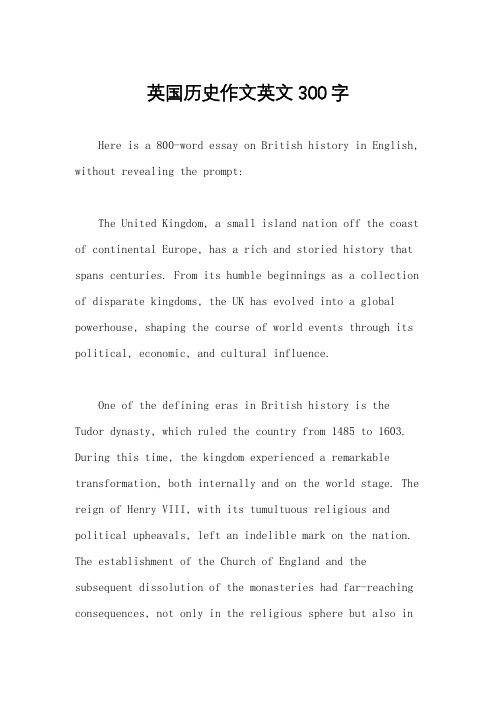
英国历史作文英文300字Here is a 800-word essay on British history in English, without revealing the prompt:The United Kingdom, a small island nation off the coast of continental Europe, has a rich and storied history that spans centuries. From its humble beginnings as a collection of disparate kingdoms, the UK has evolved into a global powerhouse, shaping the course of world events through its political, economic, and cultural influence.One of the defining eras in British history is the Tudor dynasty, which ruled the country from 1485 to 1603. During this time, the kingdom experienced a remarkable transformation, both internally and on the world stage. The reign of Henry VIII, with its tumultuous religious and political upheavals, left an indelible mark on the nation. The establishment of the Church of England and the subsequent dissolution of the monasteries had far-reaching consequences, not only in the religious sphere but also inthe social and economic realms.The Elizabethan era that followed, under the rule of Queen Elizabeth I, witnessed a flourishing of the arts, literature, and exploration. The defeat of the Spanish Armada in 1588 cemented Britain's status as a maritime power, paving the way for its eventual rise as a global empire. The works of William Shakespeare, arguably the most renowned playwright in the English language, continue to captivate audiences worldwide and serve as a testament to the cultural richness of this period.The 17th century brought with it the English Civil War, a conflict that would ultimately lead to the execution of King Charles I and the establishment of the Commonwealth of England under Oliver Cromwell. This turbulent period was followed by the Restoration of the monarchy under King Charles II, which ushered in a new era of political and social stability.The 18th and 19th centuries saw the rise of the British Empire, which at its peak spanned the globe, encompassing aquarter of the world's population and a third of its landmass. This expansionist era was marked by both remarkable achievements and controversial colonial policies, leaving a complex legacy that continues to be debated and analyzed by historians.The 20th century brought about significant challengesfor the United Kingdom, including the two World Wars, the decline of its imperial power, and the emergence of new global superpowers. Despite these trials, the UK has remained a influential player on the international stage, maintaining its position as a leading economic andpolitical force.Today, the United Kingdom stands as a vibrant, multicultural nation, grappling with the complexities of modern-day issues such as Brexit, devolution, and the ongoing process of social and cultural change. Its history, however, remains a source of national pride and a testament to the resilience and adaptability of the British people.In conclusion, the history of the United Kingdom is arich tapestry woven with threads of triumph and adversity, innovation and tradition. From the Tudor monarchs to the industrial revolution, from the heights of empire to the challenges of the modern era, the story of Britain is one that continues to captivate and inspire people around the world.。
英国历史笔记-英文版
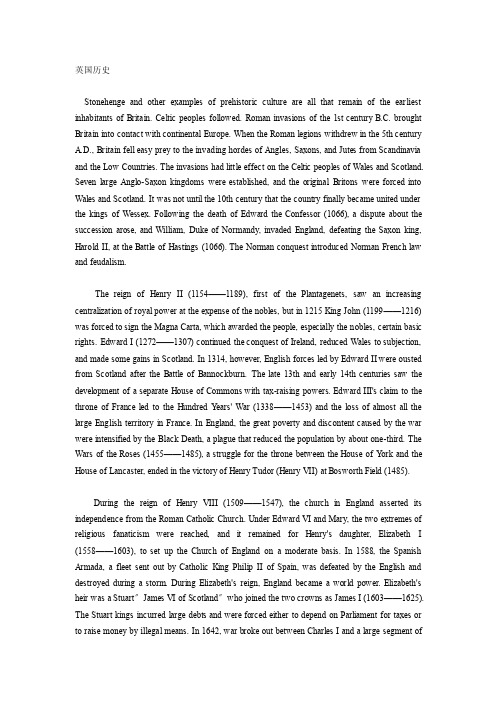
英国历史Stonehenge and other examples of prehistoric culture are all that remain of the earliest inhabitants of Britain. Celtic peoples followed. Roman invasions of the 1st century B.C. brought Britain into contact with continental Europe. When the Roman legions withdrew in the 5th century A.D., Britain fell easy prey to the invading hordes of Angles, Saxons, and Jutes from Scandinavia and the Low Countries. The invasions had little effect on the Celtic peoples of Wales and Scotland. Seven large Anglo-Saxon kingdoms were established, and the original Britons were forced into Wales and Scotland. It was not until the 10th century that the country finally became united under the kings of Wessex. Following the death of Edward the Confessor (1066), a dispute about the succession arose, and William, Duke of Normandy, invaded England, defeating the Saxon king, Harold II, at the Battle of Hastings (1066). The Norman conquest introduced Norman French law and feudalism.The reign of Henry II (1154——1189), first of the Plantagenets, saw an increasing centralization of royal power at the expense of the nobles, but in 1215 King John (1199——1216) was forced to sign the Magna Carta, which awarded the people, especially the nobles, certain basic rights. Edward I (1272——1307) continued the conquest of Ireland, reduced Wales to subjection, and made some gains in Scotland. In 1314, however, English forces led by Edward II were ousted from Scotland after the Battle of Bannockburn. The late 13th and early 14th centuries saw the development of a separate House of Commons with tax-raising powers. Edward III's claim to the throne of France led to the Hundred Y ears' War (1338——1453) and the loss of almost all the large English territory in France. In England, the great poverty and discontent caused by the war were intensified by the Black Death, a plague that reduced the population by about one-third. The Wars of the Roses (1455——1485), a struggle for the throne between the House of Y ork and the House of Lancaster, ended in the victory of Henry Tudor (Henry VII) at Bosworth Field (1485).During the reign of Henry VIII (1509——1547), the church in England asserted its independence from the Roman Catholic Church. Under Edward VI and Mary, the two extremes of religious fanaticism were reached, and it remained for Henry's daughter, Elizabeth I (1558——1603), to set up the Church of England on a moderate basis. In 1588, the Spanish Armada, a fleet sent out by Catholic King Philip II of Spain, was defeated by the English and destroyed during a storm. During Elizabeth's reign, England became a world power. Elizabeth's heir was a Stuart〞James VI of Scotland〞who joined the two crowns as James I (1603——1625). The Stuart kings incurred large debts and were forced either to depend on Parliament for taxes or to raise money by illegal means. In 1642, war broke out between Charles I and a large segment ofthe Parliament; Charles was defeated and executed in 1649, and the monarchy was then abolished. After the death in 1658 of Oliver Cromwell, the lord protector, the Puritan Commonwealth fell to pieces and Charles II was placed on the throne in 1660. The struggle between the king and Parliament continued, but Charles II knew when to compromise. His brother, James II (1685——1688), possessed none of Charles II's ability and was ousted by the Revolution of 1688, which confirmed the primacy of Parliament. James's daughter, Mary, and her husband, William of Orange, then became the rulers.Queen Anne's reign (1702——1714) was marked by the Duke of Marlborough's victories over France at Blenheim, Oudenarde, and Malplaquet in the War of the Spanish Succession. England and Scotland meanwhile were joined by the Act of Union (1707). Upon the death of Anne, the distant claims of the elector of Hanover were recognized, and he became king of Great Britain and Ireland as George I. The unwillingness of the Hanoverian kings to rule resulted in the formation by the royal ministers of a cabinet, headed by a prime minister, which directed all public business. Abroad, the constant wars with France expanded the British Emp ire all over the globe, particularly in North America and India. This imperial growth was checked by the revolt of the American colonies (1775——1781). Struggles with France broke out again in 1793 and during the Napoleonic Wars, which ended at Waterloo in 1815.The V ictorian era, named after Queen Victoria (1837——1901), saw the growth of a democratic system of government that had begun with the Reform Bill of 1832. The two important wars in V ictoria's reign were the Crimean War against Russia (1853——1856) and the Boer War (1899——1902), the latter enormously extending Britain's influence in Africa. Increasing uneasiness at home and abroad marked the reign of Edward VII (1901——1910). Within four years after the accession of George V in 1910, Britain entered World War I when Germany invaded Belgium. The nation was led by coalition cabinets, headed first by Herbert Asquith and then, starting in 1916, by the Welsh statesman David Lloyd George. Postwar labor unrest culminated in the general strike of 1926.King Edward VIII succeeded to the throne on Jan. 20, 1936, at his father's death, but he abdicated on Dec. 11, 1936 (in order to marry an American divorc谷e, Wallis Warfield Simpson), in favor of his brother, who became George VI.The efforts of Prime Minister Neville Chamberlain to stem the rising threat of Nazism in Germany failed with the German invasion of Poland on Sept. 1, 1939, which was followed by Britain's entry into World War II on Sept. 3. Allied reverses in the spring of 1940 led toChamberlain's resignation and the formation of another coalition war cabinet by the Conservative leader, Winston Churchill, who led Britain through most of World War II. Churchill resigned shortly after V-E Day, May 8, 1945, but then formed a ※caretaker§ government that remained in office until after the parliamentary elections in July, which the Labour Party won overwhelmingly. The new government, formed by Clement R. Attlee, began a moderate socialist program.(For details of World War II, see Headline History, World War II.)In 1951, Churchill again became prime minister at the head of a Conservative government. George VI died on Feb. 6, 1952, and was succeeded by his daughter, Elizabeth II. Churchill stepped down in 1955 in favor of Sir Anthony Eden, who resigned on grounds of ill health in 1957 and was succeeded by Harold Macmillan and Sir Alec Douglas-Home. In 1964, Harold Wilson led the Labour Party to victory. A lagging economy brought the Conservatives back to power in 1970. Prime Minister Edward Heath won Britain's admission to the European Community. Margaret Thatcher became Britain's first woman prime minister as the Conservatives won 339 seats on May 3, 1979.An Argentine invasion of the Falkland Islands on April 2, 1982, involved Britain in a war 8,000 mi from the home islands. Argentina had long claimed the Falklands, known as the Malvinas in Spanish, which had been occupied by the British since 1832. Britain won a decisive victory within six weeks when more than 11,000 Argentine troops on the Falklands surrendered on June 14, 1982.Although there were continuing economic problems and foreign policy disputes, an upswing in the economy in 1986——1987 led Thatcher to call elections in June, and she won a near-unprecedented third consecutive term. The unpopularity of Thatcher's poll tax together with an uncompromising position toward further European integration eroded support within her own party. When John Major won the Conservative Party leadership in November, Thatcher resigned, paving the way for Major to form a government.Eighteen years of Conservative rule ended in May 1997 when Tony Blair and the Labour Party triumphed in the British elections. Blair has been compared to former U.S. president Bill Clinton for his youthful, telegenic personality and centrist views. He produced constitutional reform that partially decentralized the UK, leading to the formation of separate Parliaments in Wales and Scotland by 1999. Britain turned over its colony Hong Kong to China in July 1997.Blair's controversial meeting in Oct. 1997 with Sinn Fein's president, Gerry Adams, was the first meeting in 76 years between a British prime minister and a Sinn Fein leader. It infuriated numerous factions but was a symbolic gesture in support of the nascent peace talks in Northern Ireland. In 1998 the Good Friday Agreement, strongly supported by Tony Blair, led to the first promise of peace between Catholics and Protestants since the beginning of the so-called Troubles.Along with the U.S., Britain launched air strikes against Iraq in Dec. 1998 after Saddam Hussein expelled UN arms inspectors. In the spring of 1999, Britain spearheaded the NA TO operation in Kosovo, which resulted in Y ugoslavian president Slobodan Milosevic's withdrawal from the territory.In Feb. 2001, foot-and-mouth disease broke out among British livestock, prompting other nations to ban British meat imports and forcing the slaughter of thousands of cattle, pigs, and sheep in an effort to stem the highly contagious disease. The episode cost farmers and the tourist industry billions of dollars.In June 2001, Blair won a second landslide victory, with the Labour Party capturing 413 seats in Parliament.Britain became the staunchest ally of the U.S. after the Sept. 11 attacks. British troops joined the U.S. in the bombing campaign against Afghanistan in Oct. 2001, after the Taliban-led government refused to turn over the prime suspect in the terrorist attacks, Osama bin Laden.Blair again proved himself to be the strongest international supporter of the U.S. in Sept. 2002, when he became President Bush's major ally in calling for a war against Iraq. Blair maintained that military action was justified because Iraq was developing weapons of mass destruction that were a direct threat to its enemies. He continued to support the Bush administration's hawkish policies despite significant opposition in his own party and the British public. In March 2003, a London Times newspaper poll indicated that only 19% of respondents approved of military action without a UN mandate. As the inevitability of the U.S. strike on Iraq grew nearer, Blair announced that he would join the U.S. in fighting Iraq with or without a second UN resolution. Three of his ministers resigned as a result. Britain entered the war on March 20, supplying 45,000 troops.In the aftermath of the war, Blair came under fire from government officials for allegedly exaggerating Iraq's possession of weapons of mass destruction. In July 2003 Blair announced that※history would forgive§ the UK and U.S. ※if we are wrong§ and that the end to the ※inhuman carnage and suffering§caused by Saddam Hussein was justification enough for the war. The arguments about the war grew so vociferous between the Blair government and the BBC that a prominent weapons scientist, David Kelly, who was caught in the middle, committed suicide. In Jan. 2004, the Hutton Report exonerated the Blair administration of any misconduct concerning the weapons inspections and concluded that it had not ※sexed-up§the intelligence dossier, an accusation put forth by BBC reporter Andrew Gilligan. The report strongly criticized the BBC for its ※defective§ editorial policies, and as a consequence, the BBC's top management resigned.In July 2004, the Butler Report on pre——Iraq war British intelligence was released. It echoed the findings of the U.S. Senate Intelligence Committee of the week before that the intelligence had vastly exaggerated Saddam Hussein's threat. The famous claim that Iraq's chemical and biological weapons ※are deployable within 45 minutes of an order to use them§was especially singled out as highly misleading. But like the U.S. report, it cleared the government of any role in manipulating the intelligence.On May 5, 2005, Blair won a historic third term as the country's prime minister. Despite this victory, Blair's party was severely hurt in the elections. The Labour Party won just 36% of the national vote, the lowest percentage by a ruling party in British history. The Conservative Party won 33%, and the Liberal Democrats 22%. Blair acknowledged that the reason for the poor showing was Britain's involvement in the war in Iraq, which was widely unpopular. A number of political analysts believe Blair will not serve out his new five-year term. Many expect him to resign in the next several years and turn over the reins of the Labour Party to Gordon Brown, the chancellor of the exchequer, whose policies many credit in creating Britain's strong and stable economy.On July 7, 2005, London suffered a terrorist bombing, Britain's worst attack since World War II. Four bombs exploded in three subway stations and on one double-decker bus during the morning rush hour, killing 52 and wounding more than 700. Four Muslim men, three of them British-born, were identified as the suicide bombers. On July 21, terrorists attempted another attack on the transit system, but the bombs failed to explode. A leaked document by a top British government official warned Prime Minister Blair more than a year before the bombings that Britain's engagement in Iraq was fueling Islamic extremism, but Blair has repeatedly denied such a link, contending that the bombings were the result of an ※evil ideology§ that had taken root before the Iraq war. Blair proposed legislation that would toughen the country's antiterrorism measures, and suffered his first major political defeat as prime minister in November, when hisproposal that terrorist suspects could be held without charge for up to 90 days was rejected16. the English are Anglo-Saxons, but the welsh, Scots and Irish are Celts.英格兰人是安各鲁-撒克逊人。
英国介绍英文版作文

英国介绍英文版作文英文回答:Introduction to the United Kingdom。
The United Kingdom, also known as Britain, is a sovereign island nation located in northwestern Europe. It comprises England, Wales, Scotland, and Northern Ireland. The UK has a rich history, a vibrant culture, and a global influence.Geography and Climate。
The UK is bordered by the North Sea to the east, the English Channel to the south, and the Celtic Sea to the west. The country has a diverse landscape, including rolling hills, mountains, and coastline. The climate is temperate, with mild winters and warm summers.History。
The history of the UK dates back thousands of years, with evidence of human habitation from prehistoric times. The Romans invaded the region in the 1st century AD, and the country was later ruled by various groups, including the Saxons, Vikings, and Normans. The United Kingdom of Great Britain and Ireland was formed in 1801, and the Republic of Ireland seceded in 1922.Politics and Government。
英国历史英文 ppt课件

Colonial Expansion 殖 民扩张
1、Began with the colonization of Newfoundland in 1583.
2、By 1900,Britain had built up a big empire, “on which the sun never set”
Roman Britain
罗马统治下的英国(公元前55年—410年)
1、In 55BC and 54BC, Julius Caesar, a Roman general, invaded Britain twice. In AD 43, the Emperor Claudius invaded Britain successfully. For nearly 400 years, Britain was under the Roman occupation, though it was never a total occupation.
3、It saw the challenge of supremacy of the Roman Catholic Church by Reformation , the rise of Humanism ,the growth of large nation-states ,the farranging voyages of exploration and a new emphasis o the importance of individual.
1、In 1833,the Grand National Consolidated Trade
abriefhistoryofBritain英国历史简述(精选五篇)

abriefhistoryofBritain英国历史简述(精选五篇)第一篇:a brief history of Britain 英国历史简述A Brief History of Britainby Pam BarrettWhen French and British construction workers met beneath the English Channel in 1990, Britain became linked to Continental Europe for the first time in 7,000 years.For it was then, when the last Ice Age ended, that melting ice flooded the low-lying lands, creating the English Channel and the North Sea and turning Britain into an island.This fact of being “set apart” was one of the two seemingly contradictory factors which would affect every aspect of the country’s subsequent history.The other was a genius for absorbing every invader and immigrant, creating a mongrel breed whose energies would establish an empire incorporating a quarter of the population of the planet.Early settlers: Stone Age people arrived, probably from the Iberian peninsula, in around 3000 BC.They lived by farming but left few traces.The most dramatic ancient monument is Stonehenge in Wiltshire, built during the next 1,000 years.How and why it was built was a mystery, but it must have had religious and political significance.The Beaker people, named after their pottery, were next to arrive.But a more importance wave of immigration, in 700 BC, was that of the Celts from eastern and central Europe.The ancestors of the Highland Scots, the Welsh and the Irish, they left behind a rich legacy of intricate and beautiful metalwork.The Romans: British recorded history began when Julius Caesar first crossed the English Channel in 55 BC.Roman rule continued for nearly 400 years, failing to subjugate only Scottish tribes, whose raiding parties were contained by Emperor Hadrian who built adefended wall right across the north of England.Eventually, threatened by barbarians at the gates of Rome, they abandoned Britain, leaving behind them a network of towns, mostly walled, a superb road system, and a new religion, Christianity.The next wave of invaders from central Europe – Angles, Saxons and Jutes – gradually pushed the native Celts west into Wales and north into Scotland.Anglo-Saxon dominance, too, lasted for four centuries, though it did not extend to Scotland, where a separate kingdom was forged by the Picts and the Scots.Although the Anglo-Saxons were a ferocious bunch, constantly squabbling, they laid the foundations of the English state, dividing the country into shires and devising an effective farming system.Their Teutonic religion, worshipping gods such as Woden and Thor, eclipsed Christianity until, at the end of the 6th century, the monk Augustine(once heard to remark “O Lord, make me chaste, but not yet”)converted the kings and the nobles.Monasteries sprang up, becoming places of learning.Treasures contained in the monasteries were a lure for the Vikings, whose ruthless raids from across the North Sea began in the 9th century.Initially they were defeated at sea by Alfred the Great, founder of the British Navy, but eventually they too were assimilated.Canute, the Danish leader, became king of Britain.The Norman Conquest: Links with Normandy, the part of France settled by the Vikings, were strong, and in 1066 William, Duke of Normandy, claimed the English throne.His triumph at the battle of Hastings decisively changed English history.As W.C.Sellar and R.J.Yeatman put it in their classic humorous history 1066 And All That: “The Norman Conquest was a Good Thing, as from this time onwards England stopped being conquered and thus was able to become top nation.”William parceled out the land to barons in return for their loyalty, and the barons parceled out land in turn to lesser nobles in return for goods and services.At the bottom were the peasants, whose feudal status resembled slavery – hence the potency of the Robin Hood legend, celebrating the Nottingham outlaw who stole from the rich to give to the poor.Although much of the Norman kings’ energies were devoted to protecting their borders, there was a great flowering of Norman culture, producing many erudite historians and scholars.In 1167 Oxford University was founded.Thanks to the influence of William Shakespeare’s history plays, much of the next period of English history is popularly remembered through his view of the shifting alliances of the Plantagenet and Tudor kings who ruled from 1154 to 1547.During this period of conflict and disease –the Black Death alone killed nearly half the population in 1348-49 –the royal succession was by no means assured.Power struggles propelled to the throne those who could command the greatest military backing from the majority of the rival barons, a process vividly illustrated by the Wars of Roses, the tussles between the House of Lancaster and York between 1455 and 1485.Frequent strife with France(including the intermittent Hundred Years’ War from 1337 to 1453)dominated international relationships.Internally, Wales was subjugated by 1288, though Scottish independence was recognized when Robert Bruce defeated English forces at the Battle of Bannockburn in 1314.Britain’s most famous king, Henry VIII, is remembered not only for his six wives(two of whom he had beheaded)but also for bringing about the Reformation, making England a Protestant rather than a Catholic countr y.His quarrel centred on the Pope’s refusal to annul his marriage to Catherine of Aragon, who couldnot oblige him with a male heir.Doctrinal differences aside, however, Henry capitalized on a growing distaste for the church’s excessive privilege and wealt h, and was thus able to get away with seizing enough monastic lands and property to finance his rule.Under Henry, Wales was formally united with England in 1536.The Age of Elizabeth: England entered its Golden Age under Elizabeth I, Henry’s daughter by Ann e Boleyn.The Elizabethan Age has a swashbuckling ring to it: the Virgin Queen and her dashing courtiers;the defeat of the Spanish Armada;Sir Walter Raleigh’s discovery of tobacco in Virginia;Sir Francis Drake’s circumnavigation of the world.Poetry, plays a nd pageantry flourished during her 45-year reign.When Elizabeth, the “Virgin Queen”, died without an heir, the throne passed to James VI of Scotland, who became James I of England, inaugurating the Stuart dynasty and effectively joining together the two kingdoms.The Stuart period was one of conflict between Crown and Parliament.James I, a staunch believer in the Divine Right of Kings, would have preferred no Parliament at all, and Charles I dissolved Parliament and initiated an 11-year period of absolute rule.The upshot was a civil war from 1622 to 1649;Charles lost and was beheaded.A period of republicanism followed, under the rule of Oliver Cromwell, but after his death the monarchy was restored and prospered under Charles II.His brother, who succeeded him as James II, was less circumspect and tried to restore absolute monarchy and the Catholic religion.The newly emerging political parties, growing in confidence, forced him to flee and invited his daughter Mary and her Dutch husband, Prince William of Orang e, to take the throne.This “Glorious Revolution”, although bloodless, was nonetheless a revolution and paved the way for Parliament’s permanent dominance overthe Crown.In 1707 an Act of Union united England and Scotland, although Scotland was allowed to retain its own Church and legislature.Many Scots felt that the union was bulldozed through by English politicians’ intent on improving their international trade prospects, and Scottish pressure to unravel the union is still a political issue.Political pragmatism triumphed again in 1714 when, a reliable Protestant monarch being needed in a hurry, a search through the family tree came up with George I of Hanover in Germany.Although he spoke no English and had little interest in his subjects, he founded a dynasty which was to span 115 years and encompass an expanding empire and an industrial revolution.The age of empire: Despite the loss of its American colonies in 1783, Britain’s trade-driven adventurism was undiminished, giving it control of West Africa and India, Newfoundland and Nova Scotia, some Caribbean island, and Australia and New Zealand.At home, farmers embraced more efficient and profitable methods, which led to the eviction of many peasant farmers who either emigrated to the New World, carrying with them a resentment that would bequeathed to future generations, or left the land to find work in the towns, which rapidly became overcrowded.This combination of landowners with surplus capital to invest and laborers in search of a living was one reason why British became the first country to industrialize.Political stability helped too, as did the security of being an island, natural resources, good trade arrangements and a native genius for inventing things.The Scottish inventor James Watt modified and improved the steam engine in the 1770s, opening the way for the efficient powering of trains, ships and factory machinery.The invention of the Spinning Jenny and the power loom created mass production in textiles.The smelting ofiron with coke, instead of charcoal, hugely increased the production of iron.A massive building program of railways, roads and canals created a new class of industrialist, whose fortunes rivaled those of the aristocracy.But it also created abominable working conditions in mines and factories, conditions which led to the slow and painful development of trade unionism.Political reforms, seized elsewhere in Europe by revolution, came gradually in Britain.Parliamentary seats were distributed more fairly among the growing new towns, but voting was still based on property ownership and universal suffrage didn’t come until 1918(and even then was scarcely universal since it excluded women under 30).The problem that dominated parliamentary debate during this period was the intractable Irish Question.The resentment over centuries of British rule in Ireland bubbled to the surface after the potato famines of the mid-1840s, when about 20 percent of Ireland’s population died of starvation and more than a million people emigrated to escape a similar fate.Demands for Irish independence grew but they were demands which many English politicians, conscious of the security problems of having an independent and possibly none-too-friendly neighbor to their west, were reluctant to grant.As with today’s IRA campai gn, the debate had a backdrop of violence.T oday, however, the Victorian Age is remembered as a time of exuberant self-confidence, symbolized by the building in London of the Crystal Palace to showcase Britain’s industrial and technical achievements in the Great Exhibition of 1851.But many of London’s inhabitants might well have wondered when they would benefit from all these accomplishments.For them, the squalor and crime which Charles Dickens portrayed so evocatively in his novels were all too real.Working-class lifeimproved considerably during the last quarter of the 19th century.Many homes had gas lighting and streets were cleaned by the new municipal councils.A new police force contained crime.The music hall provided inexpensive entertainment in towns.Bicycles became a common method of transport, and a trip by train to seaside resorts was for many a highlight of summer.In London, trains in the world’s first underground railway began puffing their way through smoke-filled tunnels between Paddington and Farrington in 1863.Art and drama flourished.By the time of Queen Victoria’s Diamond Jubilee in 1897, the country was feeling quite pleased with itself.Britannia ruled the waves, and anything seemed possible.The 20th century: But all good things come to an end.The Boer War of 1900 ended in victory for the British in South Africa but damaged its international reputation.France, Germany and America were becoming powerful competitors for world markets.The newly united German state was flexing its military muscles.The Edwardian era of the early 20th century, seemingly an idyllic time, was built on shifting sands.Dragged into World War I by a complex web of international alliances, Britain faced unimaginable carnage in which more than a million of its young men died.Social unrest at the end of the war, though less devastating than in the defeated Germany, gave more power to women(who had shouldered a heavy burden while the men were at war)and led to a General Strike by dissatisfied workers in 1926.The Irish Question was partly answered with the creation of an independent Irish free State, but six Protestant-dominated counties in the north stayed under UK rule – a time bomb which exploded in 1969.The shock waves from the 1929 New York Stock Market crash plunged Britain into depression, throwing millionsout of work, especially in the industrial areas of northern England, south Wales and Clydeside in Scotland.The monarchy was rocked by crisis in 1936 when Edward VIII, who had just become king, decided to marry the twice-divorced Mrs Wallis Simpson.His family, the church and the government opposed the match, forcing him to abdicate.His brother, a reluctant George VI, restored the monarchy’s popularity, not least through the support which he and his wife Elizabeth(later the Queen Mother)gave to their subjects during the German air raids of World War II.Although Britain’s island status saved it from invasion, this war involved civilians in an unprecedented way.Cities like Coventry were devastated by bombing and the Blitz radically changed the face of London for the first time since the Great Fire of 1666.Many children were sent to live in the countryside.Most social inequalities were set aside during the war and, when peace returned in 1945, voters turned to the Labour party in hope that it could develop an even greater egalitarianism.It laid the basis of a welfare state, providing free medical care for everyone as well as financial help for the old, the sick and the unemployed.But the war had left Britain broke.While Germany and Japan rebuilt their industries almost from scratch, helped by international aid, Britain was left to patch together a severely damaged economy.It could no longer sustain an empire, and gradually its colonies became independent.Many former subjects, especially from the Caribbean and the Indian sub-continent, settled in Britain, raising fears of racial conflict that, despite some serious tensions, were never(quite)fulfilled.As the austere 1950s gave way to the ’60s, things started to look up.New universities were built, a motorway network launched, and a reinvigorated culture promoted by a group of writersdubbed “the angry young men”.Much of the explosion of new talent came from the north of England: actors like Albert Finney, playwrights like Alan Sillitoe, and pop groups galore, led by the Beatles.The swinging Sixties, powered by a newly affluent youth, had arrived.Britain’s heavy industry might be in trouble, but in fashion and pop music it led the world.The good times died in the 1970s as inflation and unemployment soared and labour unrest led to endless strikes.Joining the European Community in 1973 seemed to produce few obvious economic benefits and revenues from North Sea oil were quickly spent rather than invested.Margaret Thatcher came to power in 1979 promising tough new policies.Her popularity quickly faded, but was revived in 1982 by the Falklands War when an invading Argentinean force was beaten off the South Atlantic islands, remnants of the old empire.Although she went on to win two further elections convincingly, by 1990 her popularity, always firmer abroad than at home, was so shaky that her party, fearing that she would not win them the next election, replaced her with a less combative leader, John Major.He duly won the 1992 election, but a reinvigorated Labour Party under T ony Blair won in 1997.The overall problems did not change, though.The economy remained weak, distrust of the European Community did not abate, nationalism simmered in Wales and Scotland, the conflict in Northern Ireland dra gged on, and the Royal Family’s private life continued to obsess the tabloid press.It was business as usual, in fact – which, in a country obsessed by continuity, was immensely reassuring.第二篇:材料学的历史简述姓名:何莞晨学号:2014012075材料学的历史简述1.按材料划分的时代生活离不开材料,人类的一切生产活动所需的工具都建立在合适的材料的基础上。
英语作文英国历史
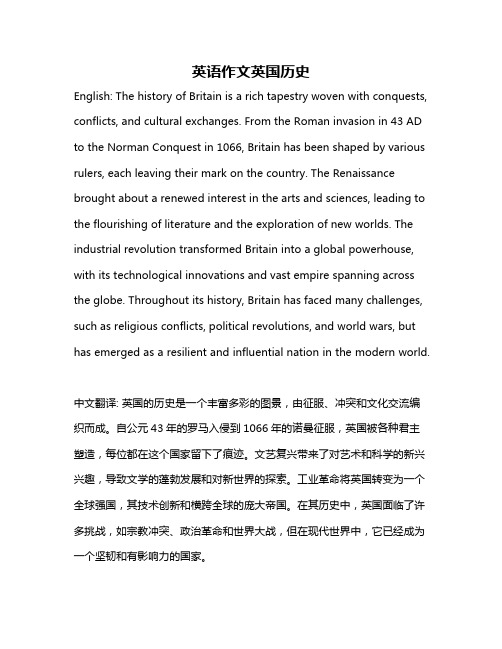
英语作文英国历史English: The history of Britain is a rich tapestry woven with conquests, conflicts, and cultural exchanges. From the Roman invasion in 43 AD to the Norman Conquest in 1066, Britain has been shaped by various rulers, each leaving their mark on the country. The Renaissance brought about a renewed interest in the arts and sciences, leading to the flourishing of literature and the exploration of new worlds. The industrial revolution transformed Britain into a global powerhouse, with its technological innovations and vast empire spanning across the globe. Throughout its history, Britain has faced many challenges, such as religious conflicts, political revolutions, and world wars, but has emerged as a resilient and influential nation in the modern world.中文翻译: 英国的历史是一个丰富多彩的图景,由征服、冲突和文化交流编织而成。
自公元43年的罗马入侵到1066年的诺曼征服,英国被各种君主塑造,每位都在这个国家留下了痕迹。
初中历史英国史整理

初中历史英国史整理**History of England in Junior High School**The history of England is rich and diverse, spanning from ancient times to the present day.英国历史丰富多彩,从古代一直延续至今。
In the early period, England was populated by Celtic tribes.早期,英格兰被凯尔特部落占据。
The Roman Empire later invaded and occupied England, leaving behind a lasting impact on its culture and architecture.后来罗马帝国入侵并占领了英格兰,对其文化和建筑产生了深远的影响。
The Norman Conquest in the 11th century marked a significant turning point, introducing feudalism and the Norman language to England. 11世纪的诺曼征服是英格兰历史上的重要转折点,它引入了封建制度和诺曼语言。
The Tudor dynasty in the 16th century saw significant religious reforms, most notably the establishment of the Church of England. 16世纪的都铎王朝见证了重大的宗教改革,最显著的是英格兰国教的建立。
The Industrial Revolution in the 18th and 19th centuries transformed England into a leading industrial power, shaping its economic and social landscape.18世纪和19世纪的工业革命使英格兰成为领先的工业强国,塑造了其经济和社会面貌。
英国历史作文英文
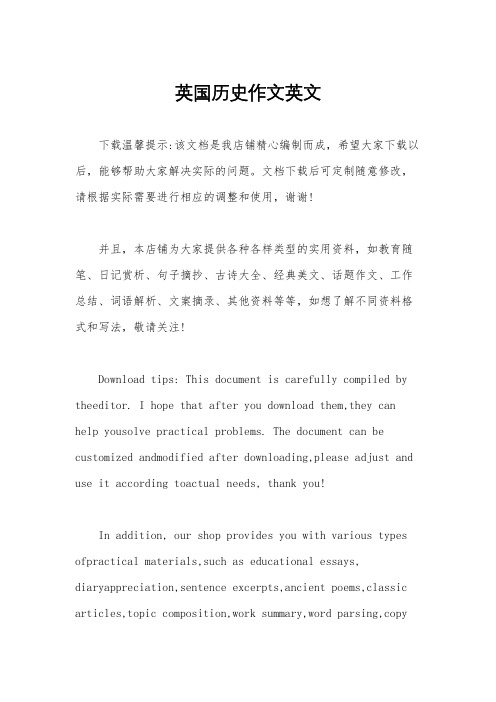
英国历史作文英文下载温馨提示:该文档是我店铺精心编制而成,希望大家下载以后,能够帮助大家解决实际的问题。
文档下载后可定制随意修改,请根据实际需要进行相应的调整和使用,谢谢!并且,本店铺为大家提供各种各样类型的实用资料,如教育随笔、日记赏析、句子摘抄、古诗大全、经典美文、话题作文、工作总结、词语解析、文案摘录、其他资料等等,如想了解不同资料格式和写法,敬请关注!Download tips: This document is carefully compiled by theeditor. I hope that after you download them,they can help yousolve practical problems. The document can be customized andmodified after downloading,please adjust and use it according toactual needs, thank you!In addition, our shop provides you with various types ofpractical materials,such as educational essays, diaryappreciation,sentence excerpts,ancient poems,classic articles,topic composition,work summary,word parsing,copyexcerpts,other materials and so on,want to know different data formats andwriting methods,please pay attention!The UK has a long history. There are so many famous historical events and figures.The British monarchy has played an important role. From the time of the kings and queens to the present.The Industrial Revolution started in the UK. It changed the world a lot.The UK has also had many wars and conflicts. Some of them had a big impact.There are many beautiful old buildings and castles in the UK. They tell the stories of the past.The culture of the UK is very rich. Literature, music, and art are all great.And don't forget about the British sense of humor. It's unique and makes people laugh.。
英国历史概况总结英文300字

英国历史概况总结英文300字BC in the Mediterranean Iberian people, BAK people, Celtic, has come to Britain. 1-5 century, south-east England, the Roman Empire. , After the withdrawal of the Romans, the Anglo people in northern Europe, Saxons, Jutes invaded and settled in succession. The 7th century the feudal system began to take shape, many small countries, and into seven kingdoms strive for hegemony over 200 years, called "Anglo - Saxon era." 829 King of Wessex love Gebert unified England. 8 end of the century the Danes were struck from 1016 to 1042 as part of the Danish Viking empire. King was later short-term rule, in 1066, Duke of Normandy crossed the sea to conquer England. In 1215 King John was forced to sign Magna Carta, kingship was inhibited. From 1338 to 1453 English law, "the Hundred Years War," the British after the defeat and win a victory. In 1588, defeated the Spanish "Armada", to establish maritime supremacy. Bourgeois revolution broke out in 1640. May 19, 1649 declared a republic. 1660 Dynasty restoration took place in 1668 "Glorious Revolution" established a constitutional monarchy. 1707 England and Scotland merged in 1801 they merged with the Irish. The latter half of the18th century to the first half of the 19th century, becoming the world's first industrial revolution, a complete country. 19th century was the heyday of the British Empire in 1914 the colonial possession of 111 times more than the local big was the first colonial power, claiming to be "follow the sun empire." After World War I began to decay. British in Northern Ireland was established in 1920, the county, and in 1921 to 1922 in southern Ireland, from its rule to allow the establishment of an independent country. Westminster Act, enacted in 1931, was forced to recognize its dominion in the internal affairs and foreign policy of independence, the British Empire, shaken from the colonial system. World War II, greatly weakened the economic strength and political status declined. With the 1947 India and Pakistan have independence, to 60 years, the British Empire, the collapse of the colonial system. In January 1973 to join the EC.。
